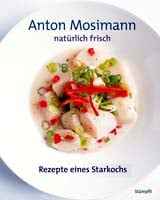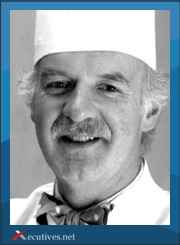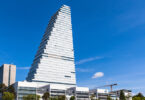Anton Mosimann (born 1947) is one of the most illustrious members of the elite European Guild of Master Chefs. A Swiss chef who went to try his luck in London 30 years ago, he has opened up new gastronomic avenues that have found acceptance all over the world. The Mosimann name has become an established brand in the upper reaches of gastronomic excellence. Anton Mosiman has been accepted by the most refined members of society in England as a most experienced host. Queen Elizabeth II awarded him the Order of the British Empire in 2004. In an interview with Christian Düblin, Anton Mosimann spoke of his career and work in London and discussed the history of the art of cooking, and his relationship with Prince Charles, Jamie Oliver, Mick Jagger and other illustrious guests.
Dueblin: Mr. Mosimann, as a young man, you went to London over 30 years ago to practice your considerable culinary skills. What made you take this step?
Anton Mosimann: In 1973, I was offered a position as Head Chef at the Dorchester Hotel in London. The Dorchester is a hotel with a very long tradition and some very illustrious guests. Anybody who was anybody would stay at the Dorchester. This offer was a tremendous opportunity and a challenge that I was keen to accept. I was just 28 at the time, but very highly motivated.
Dueblin: How did it come about that this offer was made? What made you decide to leave Switzerland behind and try your luck in England?
Anton Mosimann: Just before this offer was made I had won a Gold medal for cooking in Lucerne. A very well-known expert in the gastronomic world, Adelrich Furrer, noticed me because of the medal and the articles in the press and contacted me. He congratulated me on my success and was impressed by my attitude to cookery and various comments that I had made on this topic. He invited me to dinner in Zurich. For me that was a tremendous thrill. I, the chef from Seeland, „little Mosimann“, was being invited to dinner with the leading gastronomic expert of the day! And indeed, shortly afterwards, my wife and I travelled to Zurich and met Mr. Furrer for the famous dinner. Shortly after this, Mr. Furrer was asked by a friend in London, Eugène Käufeler, whether he could suggest a suitable Head Chef for the Dorchester Hotel in London. And so fate took its course, as it is wont to do. I was invited to an interview in London and shortly after that I became Head Chef at the Dorchester.
Dueblin: Can you describe the kitchen as it was at that time in the Dorchester?
Anton Mosimann: The hotel was managed in a very traditional fashion. The kitchen was good but very classical, kind of heavy and somewhat old-fashioned. It was clear to me that I would have to bring a wind of change into this kitchen. All the experience that I had been able to gain up to that point turned out to be very useful. My job was, nevertheless, not always easy. Right from the start I had over 100 employees under my control that I had to manage and motivate. The majority of the kitchen personnel could not understand why such a “youngster”, such as I was, should have been given the job of Head Chef. A number of the chefs had worked at the Dorchester for many years and probably expected to be promoted.
Dueblin: Before you went to the Dorchester, you worked in some of the best Palace-Hotels in Switzerland, such as those in Montreux, Lucerne and Gstaad. What were the other decisive steps in your career before you took the job in England?
Anton Mosimann: I did my apprenticeship in Twann. When it came to the final exam, I was the only one of four candidates who managed to pass. My boss at that time offered me a job in Arosa. He just could not understand why I turned down this opportunity and instead decided to go to the five-star Grand Hotel in Vilars. My time in Vilars was very tough and demanding. It was a real challenge. My boss there was an absolute perfectionist. Nevertheless, I was able to perform to his complete satisfaction and I achieved a standard that I am — even today — unwilling to compromise on. Even then, it was my ambition to get to the top of the tree in cooking and I decided only to work in places where I would be stretched and where I could learn new things.
I had several positions in the Grand hotels in Switzerland and then I went to Japan for a year as a Head Chef and was able to gain an insight into their cuisine. It is light, honest and artistic — simply marvelous! It has influenced me tremendously to this day. Before I went to Japan, I spent a year in Rome and got to know and understand Italian cuisine. Apart from that, I worked for three years in a large hotel in Canada. Another stage on my journey was Belgium, where I worked in the first ever Michelin three-star hotel outside France: the Villa Lorraine. I must also mention a particular love of mine — not to a woman, but a fish: the herring. (Laughs) I went to Stockholm to learn how to prepare it from A to Z.
Dueblin: It seems that you went to foreign countries very early in your career and were able to gain lots of experience there!
Anton Mosimann: That is correct. Even as an apprentice, I was very interested in my job and highly motivated although I have rarely opened a cookery book and tried to cook according to the recipes. I used to experiment a lot and tried to develop tasty dishes according to my own ideas. Whenever I heard about a particular ingredient or cuisine which interested me, I tried to learn all about it in the country where that ingredient or cuisine was at home. A good example of this is the herring, which I learned about by watching elderly ladies preparing them in Stockholm.
Dueblin: Did you get your positions in these illustrious hotels and restaurants through personal contacts – or how did you do it?
Anton Mosimann: (Laughs) No, I applied everywhere personally and got the jobs without any outside help. I had a good reputation and so it always worked for me. The more top hotels one has been employed in, the more attractive one becomes in the market. So one job followed the other just as I had hoped it would.
Dueblin: Mr. Mosimann, you went through the various stages that you have described and finally went to England where you had the task of running a traditional hotel — the Dorchester. Then at some point you decided to become self-employed. How did you arrive at this decision? What were you aiming for?
Anton Mosimann: During my time at the Dorchester, I trained an enormous number of good chefs. We had a waiting list of some 650 chefs of both sexes who would have liked to work with us. That was an unbelievable time. But at 40, I began to ask myself: What is next? Did I want to spend another 25 years in a hotel as Head Chef, or was there perhaps something more to do. So, after 13 years at the Dorchester under 5 different directors and having achieved two Michelin stars, I felt I wanted to step out. Getting the two stars had given me some publicity. Up to this moment, no hotel or restaurant outside France had earned two Michelin stars.
I had offers to go to Tokyo, Hong Kong, or New York. But in London, I knew a lot of people who I had grown fond of. I decided to turn down all these offers and stay in London to be my own boss. Also I noticed a church, the very one my restaurant is situated in today. Even then, there was a restaurant in this church. It came to me in a flash that here I could do my own thing. I renovated the restaurant and later bought the whole building.
Dueblin: You took upon yourself the business risks of a new enterprise. After twenty years as an employee, you decided to found your own company under your own name: Mosimann —- a restaurant of the superlatives — the Belfry in Belgravia. Tell us about your business plan.
Anton Mosimann: I considered very carefully, how I wanted to organize everything. Of course, the main objective was to provide the very best cuisine available. I was the first person to involve sponsors. There were three well-known companies who each sponsored a private dining room. In return, they were allowed to display their names and products in my clubs. This arrangement then was entirely new in marketing and PR. The three firms were: Tiffany’s, Gucci and Wedgewood. Today we have 7 private dining rooms that are all sponsored. This model was not only very successful for me but also for the participating companies. I can’t even attempt to name all the companies that would love to sponsor a dining room. The waiting list is very long.
Along with the quality of the food, the quality of these sponsors and their products must also match the highest standards. This is the only way to attract people who can afford this exquisite luxury.
Dueblin: At this point, I would like you to briefly talk about quality and how your clients in London view this factor. In the early 19th century, there were Jean Anthelme Brillat-Savarin, Antonius Anthus or Carl Friedrich von Rumohr, to name just a few outstanding personalities who became the first critical gourmets who began to occupy themselves at the highest level, also intellectually, with gastronomy. In his book „The Physiologie of Taste“, which was published in 1825, Brillat-Savarin divided people who appreciated good cuisine into four groups: The money-men, the doctors, men-about-town and the Bible-bashers. Do you find these categories of people among your guests — and if so, which do you like most?
Anton Mosimann: (Laughs) The guests I like best are the ones that appreciate my cooking and with whom I can develop a friendly relationship. Of course by that I mean mainly the guests that come back again and again. It is a great delight to cook for people who understand something about food and appreciate quality. I have been self-employed for over 20 years now and many of my original guests, who came when I started up, still come to dine and support my concept. We operate as a club. That is a model that has always been popular and successful in England, but in other countries it is just beginning to develop. Our club now has about 2,500 members. That is quite a large number, of which we are justly proud.
Dueblin: What has happened in the last 200 years since Brillat-Savarin in European cuisine?
Anton Mosimann: Well, quite a lot has happened and a detailed account would fill a book. The rather heavy cuisine of that period has been developed further. The dishes have become lighter and more varied. At that time, the portions were unbelievably enormous and this is what the guests demanded, but today, sophisticated cuisine is more reserved. With the colonizing of various countries, a number of new ingredients and influences reached Europe. Cuisine has become globalised. Directly after the Second World War, there was a tremendous exchange of culinary experience. More and more chefs went abroad and eventually came back, bringing their experiences with them. So it was that the culinary landscape became very much livelier.
A few decades ago we had the so-called nouvelle cuisine, which was certainly a milestone in the history of cooking. I was lucky enough to be one of the few people to introduce nouvelle cuisine to Great Britain. My previous Japanese experience was a big advantage. Furthermore, it is possible nowadays to eat without meat. I don’t think Brillat-Savarin would have permitted that. That, by the way, reminds me of the time when I started at the Dorchester. We often had some very big events with many guests. Sometimes a waiter would come whizzing into the kitchen saying „Help, we’ve got a vegetarian!“ (Laughs) That was a fairly frequent and devastating moment. Vegetarians caused a tremendous chaos in our minutely planned cooking schedule. Today, it is no longer possible to consider only offering dishes containing meat.

Anton Mosimann: natürlich frisch. ISBN 3727213361
Dueblin: You have taken great pains to understand and then express nouvelle cuisine and in doing so have influenced it considerably. What are the main characteristics of nouvelle cuisine?
Anton Mosimann: Nouvelle cuisine’s main characteristic is that fresh food is used and is prepared à la minute, which is to say immediately before it is consumed. Traditional cuisine often uses products that have been prepared hours or even days before. Nouvelle cuisine attempts to preserve the original taste of the ingredients and is much lighter than traditional cuisine. This applies especially to sauces. For instance, heavy béchamel sauces were abandoned. Nouvelle cuisine is also influenced by the cuisine of other countries. And so, for instance, Japanese cuisine inspired nouvelle cuisine in Europe. Guests enjoy their nouvelle cuisine in a more leisurely fashion, savoring each of the many scaled-down courses. This cuisine, in the right hands, is fantastic. Many chefs have misunderstood nouvelle cuisine and serve up menus under this label that in no way merit it.
I myself created what I call cuisine naturelle. Its main characteristic is that it does without such ingredients as butter, cream, and alcohol. The focus is concentrated even more on the flavor of the individual ingredients. The dishes are only lightly cooked. In nouvelle cuisine and also cuisine naturelle, enormous emphasis is put on the presentation of the dishes. Presentation is also very important to me. I try to present each dish so that it is a feast for the eyes. My latest cookery book has just been published. (Editor’s note: Anton Mosimann, Natürlich frisch, Rezepte eines Starkochs, Stämpfli Verlag AG, 2008) In this book, I look intensively at the possibilities of cuisine naturelle.
Dueblin: Brillat-Savarin talks of „The refinement of humanity through epicurean delights.“ Judging from your remarks, may I assume that you are following this same ideal?
Anton Mosimann: In my opinion, cuisine has to be good! You have to train your senses and then continue to develop them. Excellent cuisine can inspire and for that reason, it must be nurtured.
Dueblin: You count among your guests everyone who is anyone. Recently you cooked for the IOC (International Olympic Committee) at the Beijing games. What does it take, apart from good food, to please one’s guests?
Anton Mosimann: You have to be innovative and present the dishes properly. It takes a certain amount of talent to know which dishes go together — and also a certain communicative facility. Diners appreciate being able talk to the chef. I advise my guests and introduce them to new ideas or specialties. You have to be able to give the guest the feeling that he or she is genuinely welcome, and that you are trying to give of your best for them. It is also important to display a certain humility with respect to the guest. The focus must always be on the final product.
Dueblin: Is it possible to remain modest even though you have cooked for Queen Elizabeth II and after receiving the Order of the British Empire and meeting famous people day after day?
Anton Mosimann: Yes it is true, I have cooked at many state banquets for Downing Street in honor of foreign heads of state and cook every now and again for the Royal Family. But for me, it is always the product that is important. That I have the opportunity to get to know some interesting people and occasionally even make friends with important personalities is a welcome side-effect. If you are engaged as a chef by people all over the world, then you are able to make some interesting trips. I appreciate all these advantages and I’m very grateful for them. But, even so, my feet are firmly planted on the ground.
Dueblin: So, in a way, you have become an ambassador for Switzerland. In your opinion, how do you personally, and your illustrious guests see Switzerland?
Anton Mosimann: As far as I can gather from conversations with my guests, they have a very positive view of Switzerland. Prince Charles and the Royal Family know Switzerland well from their regular skiing holidays and they are very appreciative of our country. Kofi Annan also seems to have developed a strong attachment to Switzerland. He was in Davos a little time ago and asked me to pass on his best wishes to Prince Charles, which I very gladly did. So in addition to my life as a chef, in a modest way, I have also become an ambassador. In connection with Switzerland, a good quality of life, safety, cleanliness and dependability are always mentioned. Cities, such as Zurich or Geneva are very popular. Also the winter sports centers are very popular in England.
It is interesting to note that lots of people appreciate the fact that Switzerland has not joined the EU and has retained the Swiss Franc. Also Swiss neutrality is much admired and is often a topic of conversation. But that is all political and I am not in the least politically involved. I don’t really understand politics much. Whether Left or Right, Labour or Conservative, Democrats or Republicans, it is my experience that they all like to eat well and appreciate a good drop of wine. (Laughs)
Dueblin: Do you see any need for Swiss cuisine and the training of chefs to be improved or is Switzerland in good shape?
Anton Mosimann: We would like to have more young people, also from Switzerland, looking to gain experience abroad In London. Talking to my Swiss colleagues, I get the impression that only very few young cooks can be encouraged to gain some experience in other countries. That is a great pity because experience in other countries is very important. Not only with regard to preparing food but also because it broadens their horizons, improves their knowledge of languages and the ability to deal with guests from other countries and cultures.
Dueblin: In 2000, you tried to establish an exquisite restaurant near Olten, but this didn’t work out. What were the reasons for this?
Anton Mosimann: The reasons for the lack of success were manifold. Perhaps the idea of a Dining Club was a little premature. Something that in other countries has been a success for decades and which is highly appreciated by the clients, failed to find favor in Switzerland. However, I have observed that clubs that have been established in the meantime are doing very well. Another factor was the location, which was ideal in many ways, but it was too far away from the main centers such as Basel or Zurich. I wouldn’t be surprised if a number of successful clubs spring up in the next few years. People in Switzerland also have a desire to meet in dignified surroundings in the company of others of similar sophistication. For this reason there is a demand for establishments that offer discretion and tranquility.
Dueblin: You have sold that restaurant.
Anton Mosimann: That is correct. I sold it to the local council. I understand that the new owners have made a success of it.
Dueblin: Did you not consider carrying on with the restaurant a little longer? The opening took place in a difficult economic period. I ask because the case reminds me of the Mystery Park that Erich von Däniken opened, but which was also a failure. He suggested during an interview that he should have stuck it out a bit longer before admitting defeat.
Anton Mosimann: That was indeed an option that we considered. During this time, I asked myself several times where I felt more at home and it became clear to me that that place was London. I have many good friends there, I feel at home and I’m very happy. So for those reasons I decided to give up my base in Switzerland once more. It is very difficult to maintain such a high standard at two locations simultaneously.
Dueblin: As we already discussed, you are not only a chef but an entrepreneur. In your restaurant, there are more than 100 employees. What were the most difficult problems and challenges that you had to overcome in the last 20 years?
Anton Mosimann: Even in the rarified atmosphere of gourmet gastronomy you still notice whether the economic situation is good or not. Around 80% of our guests are business people from around the world. The war in Kuwait caused us some problems for a while. I had to reduce the kitchen personnel and dismiss a number of my employees. However, thanks to these timely measures, the economic crisis and the worldwide uncertainty have had little effect on our business. Today, we are more resistant to such crises. Our customer base has increased very satisfactorily in the last few years and so the whole business has gained in stability.
Dueblin: At the moment, Jamie Oliver is a name that one comes across quite frequently. Can you tell us anything about him?
Anton Mosimann: 25 years ago I was one of the first cooks to produce cookery shows for the BBC and other channels. That was an exciting challenge. These cooking shows were well received. Today other cooks are on TV and Jamie Oliver is one of them. I know him well. He is a very good cook and knows how to present himself. These shows are marketing and PR instruments. His shows are watched by a very large number of people. I don’t always agree with him, however, but that doesn’t really matter because fortunately eating is a matter of personal taste. There is no doubt that Jamie Oliver is a young and creative person who can inspire many people to cook better.
Dueblin: Mr. Mosimann, I know that you are quite close to Prince Charles and that you see and cook for him quite often. There are lots of articles written about him by people who have never got to know him personally. What sort of person is Prince Charles?
Anton Mosimann: Prince Charles is a very distinguished and fine person. He is always good humored and works very hard. I would almost say that he is a workaholic. He is often traveling around for charities, supports a whole list of cultural events by his presence and he is his own man. He is very approachable and takes his time to talk to people. I think that he is sometimes misunderstood. I have met him repeatedly over the last 30 years and hold him in high esteem. I also knew Diana well, and that was before they were married. She remains in my memory as an amazing and very pleasant person.
Dueblin: Finally, I would like to ask you to tell us some anecdote regarding one of your illustrious guests.
Anton Mosimann: (Laughs) There are so many stories! In our club, you have to wear a tie and we don’t like trainers. English society sets great store by etiquette. However, when superstars like Mick Jagger turn up in a turtleneck pullover, you can’t turn them away. We do make an exception now and again. Quite recently, we did a survey of our guests. We wanted to know whether we could dispense with ties over lunch. Our members were of the opinion that due to the very hot summer, it would be possible to come to the club without a tie at lunchtime. Since then the rule is: Lunchtime without, evenings with. However, our experience is that despite the rule, 90% of our guests come to lunch wearing a tie. On this topic, the following comes to mind: two years ago we were invited once more to the Queen’s birthday ceremony. Everybody who is anybody was there and it was terribly hot on that day. Many of the guests were sweating quite noticeably. But despite the heat, no one took off their jackets. So you see, in England it takes more than a heat wave to cause them to depart from tradition.
Dueblin: Mr Mosimann, I wish to thank you sincerely for this interview and wish you and your cooking projects continued success.
(C) 2008 by Christian Dueblin. Alle Rechte vorbehalten. Anderweitige Publikationen sind nur mit ausdrücklicher Genehmigung des Autors gestattet.
__________________________
List of Literature (Deutsche Nationalbibliothek):
| 1. | Natürlich frisch Mosimann, Anton. – Bern : Stämpfli, 2008, Dt. Ausg. ISBN 978-3-7272-1336-6 |
||
| 2. | Mosimanns natürliche Küche Zürich : Werd-Verl., [2000] ISBN 3-85932-355-5 |
||
| 3. | Mosimann’s vegetarische Küche Zürich : Werd-Verl., 1999, ISBN 3-85932-268-0 |
||
| 4. | Mosimann’s kulinarische Schweiz Mosimann, Anton. – Aarau/Schweiz : AT-Verl., 1998, ISBN 3-85502-626-2 |
||
| 5. | Natürlich, leichtes Kochen mit Anton Mosimann Aarau, Schweiz : AT-Verl., 1996, ISBN 3-85502-598-3 |
||
| 6. | Mosimann’s World. Boxtree Ltd (August 26, 1996) ISBN-13: 978-0752205113 |
||
| 7. | The Art of Anton Mosimann. ISBN-13: 978-0861458790 |
||
| 8. | Le gran libro del marisco Madrid : Ed. Everest, 1990, ISBN 84-241-2282-8 |
||
| 9. | Anton Mosimann’s Fish Cuisine Ten Speed Pr (March 1993) ISBN-13: 978-0898155433 |
||
| 10. | Cuisine naturelle Mosimann, Anton. – Düsseldorf : Econ-Verl., 1988, 2. Aufl. ISBN 3-430-16819-8 |
||
| 11. | Shellfish Hearst Books (August 1987) ISBN-13: 978-0688066307 |
||
| 12. | Meisterkurs für Hobbyköche Mosimann, Anton. – München : Heyne, 1987, Taschenbuchausgabe ISBN 3-453-00901-0 |
||
| 13. | Das grosse Buch der Meeresfrüchte Füssen : Teubner, 1985, ISBN 3-7742-3635-6 |
||







